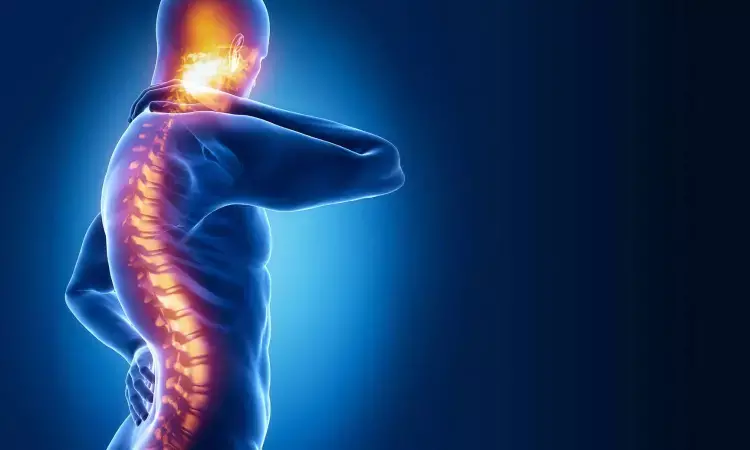- Home
- Medical news & Guidelines
- Anesthesiology
- Cardiology and CTVS
- Critical Care
- Dentistry
- Dermatology
- Diabetes and Endocrinology
- ENT
- Gastroenterology
- Medicine
- Nephrology
- Neurology
- Obstretics-Gynaecology
- Oncology
- Ophthalmology
- Orthopaedics
- Pediatrics-Neonatology
- Psychiatry
- Pulmonology
- Radiology
- Surgery
- Urology
- Laboratory Medicine
- Diet
- Nursing
- Paramedical
- Physiotherapy
- Health news
- Fact Check
- Bone Health Fact Check
- Brain Health Fact Check
- Cancer Related Fact Check
- Child Care Fact Check
- Dental and oral health fact check
- Diabetes and metabolic health fact check
- Diet and Nutrition Fact Check
- Eye and ENT Care Fact Check
- Fitness fact check
- Gut health fact check
- Heart health fact check
- Kidney health fact check
- Medical education fact check
- Men's health fact check
- Respiratory fact check
- Skin and hair care fact check
- Vaccine and Immunization fact check
- Women's health fact check
- AYUSH
- State News
- Andaman and Nicobar Islands
- Andhra Pradesh
- Arunachal Pradesh
- Assam
- Bihar
- Chandigarh
- Chattisgarh
- Dadra and Nagar Haveli
- Daman and Diu
- Delhi
- Goa
- Gujarat
- Haryana
- Himachal Pradesh
- Jammu & Kashmir
- Jharkhand
- Karnataka
- Kerala
- Ladakh
- Lakshadweep
- Madhya Pradesh
- Maharashtra
- Manipur
- Meghalaya
- Mizoram
- Nagaland
- Odisha
- Puducherry
- Punjab
- Rajasthan
- Sikkim
- Tamil Nadu
- Telangana
- Tripura
- Uttar Pradesh
- Uttrakhand
- West Bengal
- Medical Education
- Industry
Early surgery plays crucial role in preventing neuropathic pain after traumatic spinal cord injury: Study

China: A recent retrospective study highlights the benefit of early and ultra-early surgical intervention in neuropathic pain (NeP) prevention among patients with incomplete traumatic spinal cord injury (SCI).
The retrospective study published in the Journal of Orthopaedic Surgery and Research delved into the impact of the time-lapse from injury to surgery on neuropathic pain development post-traumatic spinal cord injury and underscored the importance of optimizing surgical timing to improve patient outcomes.
"Among the 320 cases, NeP was prevalent in 48.4%. Significantly, early surgery proved pivotal in NeP prevention for incomplete SCI (AIS B, C, and D) patients, emphasizing the need for optimized surgical timing," the researchers reported.
Traumatic spinal cord injury is a devastating disorder often accompanied by neuropathic pain that significantly impacts patients' quality of life. Wenge Liu, Fujian Medical University Union Hospital, Fuzhou, China, and colleagues aimed to determine the impact of the time from injury to surgery on NeP development following traumatic SCI.
For this purpose, the researchers reviewed the medical records of traumatic SCI patients who underwent surgical intervention between 2017 and 2021. Variables associated with NeP including injury profiles, demographics, pain assessments, and surgical details were investigated. Multivariate logistic regression analysis was used to identify independent risk factors related to NeP. 320 patients (mean age 56.5 ± 13.2 years; 76.6% males) met the inclusion criteria.
The study led to the following findings:
- Neuropathic pain was identified in 48.4% of patients.
- The multivariate analysis identifies age at injury, the neurological level of injury, and the Injury Severity Score as independent risk factors for NeP development in both AIS A and AIS B, C, and D subgroups.
- A significant association between the time from injury to surgery and NeP was observed in AIS B, C, and D patients, while no such association was found in AIS A patients.
The study proposed that incomplete AIS B, C and D patients with acute traumatic SCI would benefit from surgical intervention performed within 8 and 24 h from time to injury, with a lowered risk of developing neuropathic pain versus those who undergo surgical intervention later than 24 h.
"These findings provide evidence for the crucial role of early surgical intervention, strengthen the overall management of traumatic SCI, and provide information for clinical decision-making," the researchers wrote.
"Further research is warranted to elucidate the underlying mechanisms and potential therapeutic interventions to reduce neuropathic pain in SCI patients," they concluded.
Reference:
Shi, T., Yu, Z., Chen, Z. et al. The impact of time from injury to surgery on the risk of neuropathic pain after traumatic spinal cord injury. J Orthop Surg Res 18, 857 (2023). https://doi.org/10.1186/s13018-023-04355-7
Dr Kamal Kant Kohli-MBBS, DTCD- a chest specialist with more than 30 years of practice and a flair for writing clinical articles, Dr Kamal Kant Kohli joined Medical Dialogues as a Chief Editor of Medical News. Besides writing articles, as an editor, he proofreads and verifies all the medical content published on Medical Dialogues including those coming from journals, studies,medical conferences,guidelines etc. Email: drkohli@medicaldialogues.in. Contact no. 011-43720751


